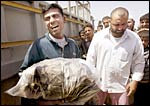Home > US Edition > The Gulf War II > Reuters > Report
3,000 bodies dug out of mass grave in Iraq
Huda Majeed Saleh in Mahawil |
May 14, 2003 18:39 IST
Iraqi families in Mahawil, about 90 km south of Baghdad, mourned on Wednesday, overwhelmed by a vast mass grave where they fear up to 15,000 people reported missing in the area may have been buried.
Piles of bones and rotten clothing littered the site, which may be one of the largest of a string of mass graves uncovered since the fall of Saddam Hussein.
 People wailed with grief as they used faded identity cards found among the skeletons to determine whether it was a brother, father or some other relative missing since Saddam's government cracked down on Shi'ites when they launched an uprising in 1991.
People wailed with grief as they used faded identity cards found among the skeletons to determine whether it was a brother, father or some other relative missing since Saddam's government cracked down on Shi'ites when they launched an uprising in 1991.
Some local residents reported hearing gunfire from the site in that year, while others said they saw trucks full of dead bodies drawing up there.
Araya Hussein took the remains of her husband away in a bag.
"He went missing in 1991 when we had ten children," said the weeping woman. "I thought he was a prisoner and would one day come home. I never imagined I would be carrying his bones home."
Others silently studied scraps of clothing or items such as wallets, eyeglasses and even an artificial leg, among the bones.
"I believe my brother and father have been buried in this place," said one aggrieved man who did not give his name.
"Saddam's security forces came to the house to get them one day in 1991."
Rafid al-Husseini, a local Iraqi doctor trying to organise the retrieval, said more than 3,000 bodies had already been unearthed in seven days of digging and many more could be found.
Husseini estimated between 10,000 to 15,000 Iraqis had been reported missing in a large swathe of the region south of Baghdad, but, with the search still underway, it was not clear if all those unaccounted for were at Mahawil.
"The most important matter for Iraqi people now is searching for missing relatives," said Husseini.
Many families stood silently behind a ring of barbed wire coils separating them from the excavation in an attempt to preserve the site but others walked through the piles.
There were no forensic experts or US military forces present and human rights groups fear that evidence of atrocities could be lost forever.
Since Saddam's fall in the US-led war on Iraq, mass graves have been unearthed in Najaf, Basra, Babylon and other areas and are still being found as Iraqis recount tales of arrests, torture and killings once too risky to tell.
The human rights group Amnesty International has said it has information about 17,000 disappearances in Iraq over the past 20 years but that the actual figure may be much higher.
Writing by Christine Hauser, editing by Philippa Fletcher.
Photo: Mario Tama/Getty Images
© Copyright 2003 Reuters Limited. All rights reserved. Republication or redistribution of Reuters content, including by framing or similar means, is expressly prohibited without the prior written consent of Reuters. Reuters shall not be liable for any errors or delays in the content, or for any actions taken in reliance thereon.
|